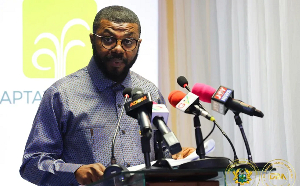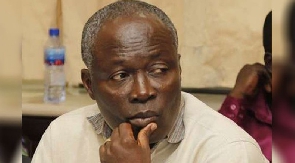Dr. Prince Hamid Armah, Chairman of the New Patriotic Party's (NPP) Manifesto Committee on Education, has said that beyond the free Senior High Schools (SHS) flagship policy, the government's success in education cannot be ignored.
Dr. Armah, the former National Council for Curriculum and Assessment (NaCCA) boss, said those improvements were so glaring in Ghana’s education facets.
Speaking to journalists in Accra after the State of Education in Ghana, delivered by the sector minister, Dr. Yaw Osei Adutwum, Dr. Armah noted that teachers’ welfare and professionalism, as well as education infrastructure, had not been left out of the “success story.”
He said the current government was on a good path to reclaim Ghana’s former glory, with evidence of progress seen at the basic, secondary (technical and vocational), and tertiary levels.
Dr. Prince Armah, who is also the Member of Parliament for Kwesimintsim, said the achievements of the government in education could not be appreciated without an understanding of where the country was coming from.
Providing a trajectory for the development of the education sector, Dr. Armah, who is also the Deputy Minister of Works and Housing, said the best way to assess a country’s performance in education is through international assessment trends.
According to him, from 2015 to 2016, prior to the NPP's coming into power, the Early Grade Assessment both in Math and Literacy showed a depressing performance of the country’s youth, with a huge percentage unable to read, comprehend, and write, as well as tabulate.
“Results of WASSCE were low, with an average of 30 percent pass rate in some of the core subjects... basic instructional supplies for teachers eluded the teachers to the extent that even common chalk to write, they didn’t have,” he said.
Dr. Prince Armah said that, due to the above, the Akufo-Addo-Bawumia government took up the challenge by instituting bold education reforms that impacted not just the education infrastructure but the curriculum as well.
He said over 2,731 infrastructure projects have been completed so far, which cuts across all the sectors of education.
The MP said out of the figure, 1,430 infrastructure projects were at the basic level, 1,144 at the SHS, and 138 at the tertiary, with two infrastructure projects each for model schools and TVET centres.
Contrary to claims by the opposition that the government had abandoned school projects, Dr. Armah said of the total projects completed, 1,651 of them were legacy projects, with 1,080 of them being new projects.
These projects, he said, were to ensure that the students studied in a more congenial environment.
According to him, the government decided to change the curriculum and institute a standard-based curriculum to address the country’s needs.
He said the previous curriculum was not based on standards and competency; it was only hinged on the student’s ability to regurgitate, or what was called chew, and poor pass-and-forget, which was inimical to the growth and development of the country.
Dr. Armah, a curriculum expert, said that while at NACCa, he supervised the production of textbooks, which were also in consonance with the curriculum change.
According to him, a fidelity implementation plan has been done to ensure the objectives of the entire reforms will be met.
For the reforms to be successful, he said teachers would be made more competent and efficient.
“With the teacher reforms, a Ghanaian teacher can be accepted globally without necessarily having to take other exams in the countries they want to teach,” he said.
Click to view details



Politics of Tuesday, 6 August 2024
Source: GNA

















